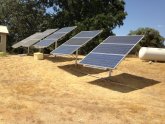There are some of living & doing the offgrid life and have for years, some even decades and there are many lessons learned to be shared... There are also Armchair experts and a few youtube University graduates who wouldn't know which end of a screw driver to use... God help'em if they ever get a hammer hehehe...
First things First: DONT BUY ANYTHING !
- Make a PLAN because without a plan, you are planning for failure.
- Figure out for yourself what you are willing to invest into offgrid Freedom & Independence.
- Always keep in mind that you should have a 20% cash buffer above & beyond what you think you need to budget.
- Decide if you want to go all Tier-1 High Quality products. they cost more BUT you get what you pay for. Also down the road sometime, when the place you have get's sold, Name Brand Tier-1 products increase value, which 3rd Tier Value stuff does not. Tier One is Midnite Solar, Magnum, Victron (really nice) and so on. 3rd Tier is the cheapo value stuff that has no UL/ETL/CSA certifications either.
- Decide if you want everything to be "New" or is previously enjoyed acceptable ? There are phenomal deals on solar panels.
- As you are offgrid and intend to stay Free, you won't have to worry about special permits & grid installation inspections BONUS !
- ask questions, consider the answers & "opinions" with critical, logical rational thinking. Engage Common Sense and have a Cow Lick at hand.
- NO SUCH THING AS A STUPID QUESTION, Except for the one that is unasked !
Have a look at the various links in my signature, starting with "About my system", (needs to be updated, will be soon) and you may get a few ideas from there from practical application. Also do watch Will's Videos (great introduction to the basics) and look at the main website for more "docs" and reference info. NOTE: Will's main focus on Mobile, RV and such, residential is a tad more involved and he's just starting down that path.
BTW, One of our good members bought out a bankrupted solar installer and got all the inventory.
@JeepHammer has the various pieces listed for sale to the membership at extremely reasonable prices, see links below. He is also a Treasure Trove of information as he has been an offgridder for decades and knows his stuff ! Threads related to JH's goodies and such.
An entire semi truck load of panels that are nearly 6 feet tall, 250-350W An entire semi truck load of inverters, meters, combiner boxes, etc. So much I can't even inventory most of it. This most definitely is NOT the 'Hobby' stuff, all high end panels, high end, but older inverters, all...

diysolarforum.com
*IF* You want a big 'OFF GRID' (battery backup or powered) system, WATCH THIS VIDEO FOR AC COUPLING instead of all DC wiring, and save money on big systems... ===================================================== As per Will's approval, I'm posting here. I'm going to share with forum users...

diysolarforum.com
Hope that helps.
Steve




